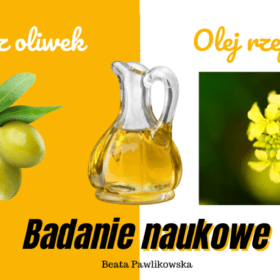Olej rzepakowy: to, o czym nikt nie mówi. Badania naukowe
Zdrowe tłuszcze są ważne i niezbędne dla zdrowia. Na pewno nie należy do nich rafinowany olej rzepakowy sprzedawany w sklepach. W tym filmie przedstawiam badania naukowe wyjaśniające szkodliwość oleju rzepakowego, m.in.:
- Olej rzepakowy zawiera kwas erukowy wywołujący choroby serca. Europejski Urząd ds. Bezpieczeństwa Żywności EFSA ostrzega, że dzieci są narażone na zbyt wysoki poziom kwasu erukowego zawartego w pożywieniu.
- Wg danych Ministerstwa Rolnictwa i Rozwoju Wsi Polska importuje „znaczne ilości” nasion rzepaku i oleju rzepakowego. Importujemy je z krajów, gdzie dozwolone jest stosowanie upraw GMO.
- Rafinowany olej rzepakowy zawiera śladowe ilości substancji odżywczych.
- Rafinowany olej rzepakowy zawiera dwa razy więcej prozapalnych kwasów tłuszczowych Omega 6 niż Omega 3. Kwasy tłuszczowe Omega 6 są wszechobecne w pożywieniu i prowadzą do tlących się, przewlekłych stanów zapalnych uważanych za przyczynę powstania wielu chorób, m.in. nowotworów, cukrzycy, otyłości, chorób serca i innych.
Badania naukowe:
- Sun, Y., Magnussen, C. G., Dwyer, T., Oddy, W. H., Venn, A. J., & Smith, K. J. (2018). Cross-Sectional Associations between Dietary Fat-Related Behaviors and Continuous Metabolic Syndrome Score among Young Australian Adults. Nutrients, 10(8), 972.
- Rapeseed in China, Alain. P. Bonjean, Céline Dequidt, Tina Sang, Groupe Limagrain OCL, 23 6 (2016) D605 Published online: 2016-11-18
- “Polski handel zagraniczny artykułami rolno-spożywczymi w 2021 roku (dane wstępne)”, Ministerstwo Rolnictwa i Rozwoju Wsi Warszawa, 11 marca 2022 r
- Chien, K. R., Bellary, A., Nicar, M., Mukherjee, A., & Buja, L. M. (1983). Induction of a reversible cardiac lipidosis by a dietary long-chain fatty acid (erucic acid). Relationship to lipid accumulation in border zones of myocardial infarcts. The American journal of pathology, 112(1), 68–77.
- DiNicolantonio JJ, O’Keefe JH, Omega-6 vegetable oils as a driver of coronary heart disease: the oxidized linoleic acid hypothesis Open Heart 2018;5:e000898.
- Ahmad Esmaillzadeh, Leila Azadbakht, Home use of vegetable oils, markers of systemic inflammation, and endothelial dysfunction among women, The American Journal of Clinical Nutrition, Volume 88, Issue 4, October 2008, Pages 913–921
- D’Angelo, Stefania, Maria L. Motti, and Rosaria Meccariello. 2020. „ω-3 and ω-6 Polyunsaturated Fatty Acids, Obesity and Cancer” Nutrients 12, no. 9: 2751. https://doi.org/10.3390/nu12092751
- Mojtaba Yousefi, Hedayat Hosseini – Evaluation of Hexane Content in Edible Vegetable Oils Consumed in Iran, Journal of Experimental and Clinical Toxicology, November 2017.
- Azrul Hisyam Samsuri,1 May Yen Ang,1 and Shean Yeaw Ng, Optimization of Residual Hexane in Edible Oils Analysis Using Static Headspace Gas Chromatography, International Journal of Analytical Chemistry, October 2021 Volume 2021.
- Innes JK, Calder PC. Omega-6 fatty acids and inflammation. Prostaglandins Leukot Essent Fatty Acids. 2018 May.
- Patterson, E., Wall, R., Fitzgerald, G. F., Ross, R. P., & Stanton, C. (2012). Health implications of high dietary omega-6 polyunsaturated Fatty acids. Journal of nutrition and metabolism, 2012.
- Chen, L., Deng, H., Cui, H., Fang, J., Zuo, Z., Deng, J., Li, Y., Wang, X., & Zhao, L. (2017). Inflammatory responses and inflammation-associated diseases in organs. Oncotarget.
- Furman, D., Campisi, J., Verdin, E. et al. Chronic inflammation in the etiology of disease across the life span. Nat Med 25, 1822–1832 (2019).
- DiNicolantonio, J. J., & O’Keefe, J. H. (2018). Importance of maintaining a low omega-6/omega-3 ratio for reducing inflammation. Open heart.
- Steur M, Johnson L, Sharp SJ, Imamura F, Sluijs I, Key TJ, Wood A, Chowdhury R, Guevara M, Jakobsen MU, Johansson I, Koulman A, Overvad K, Sánchez MJ, van der Schouw YT, Trichopoulou A, Weiderpass E, Wennberg M, Zheng JS, Boeing H, Boer JMA, Boutron-Ruault MC, Ericson U, Heath AK, Huybrechts I, Imaz L, Kaaks R, Krogh V, Kühn T, Kyrø C, Masala G, Melander O, Moreno-Iribas C, Panico S, Quirós JR, Rodríguez-Barranco M, Sacerdote C, Santiuste C, Skeie G, Tjønneland A, Tumino R, Verschuren WMM, Zamora-Ros R, Dahm CC, Perez-Cornago A, Schulze MB, Tong TYN, Riboli E, Wareham NJ, Danesh J, Butterworth AS, Forouhi NG. Dietary Fatty Acids, Macronutrient Substitutions, Food Sources and Incidence of Coronary Heart Disease: Findings From the EPIC-CVD Case-Cohort Study Across Nine European Countries. J Am Heart Assoc. 2021 Dec 7.
- Gaeini Z, Mirmiran P, Bahadoran Z, Aghayan M, Azizi F. The association between dietary fats and the incidence risk of cardiovascular outcomes: Tehran Lipid and Glucose Study. Nutr Metab (Lond). 2021 Oct 30.
- Mariamenatu, A. H., & Abdu, E. M. (2021). Overconsumption of Omega-6 Polyunsaturated Fatty Acids (PUFAs) versus Deficiency of Omega-3 PUFAs in Modern-Day Diets: The Disturbing Factor for Their „Balanced Antagonistic Metabolic Functions” in the Human Body. Journal of lipids, 2021.
- Lauretti, E., Praticò, D. Effect of canola oil consumption on memory, synapse and neuropathology in the triple transgenic mouse model of Alzheimer’s disease. Sci Rep 7, 17134 (2017).
- Blasbalg, T. L., Hibbeln, J. R., Ramsden, C. E., Majchrzak, S. F., & Rawlings, R. R. (2011). Changes in consumption of omega-3 and omega-6 fatty acids in the United States during the 20th century. The American journal of clinical nutrition.
- Dalen JE, Alpert JS, Goldberg RJ, Weinstein RS. The epidemic of the 20(th) century: coronary heart disease. Am J Med. 2014 Sep.







